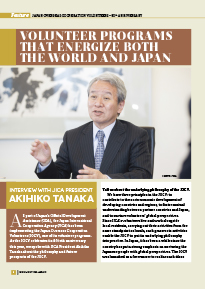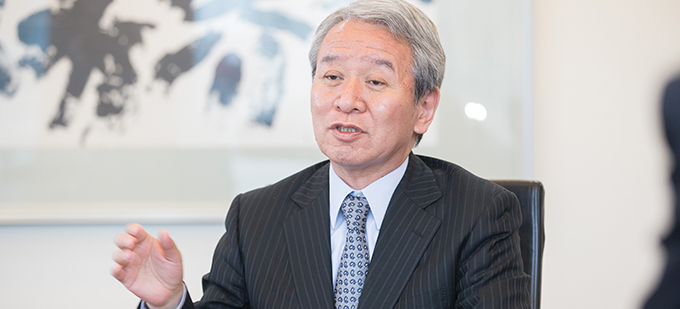Home > Highlighting JAPAN >Highlighting Japan August 2015>Japan Overseas Cooperation Volunteers—50th Anniversary
Highlighting JAPAN

Japan Overseas Cooperation Volunteers—50th Anniversary
Volunteer Programs That Energize Both the World and Japan
Interview with JICA President Akihiko Tanaka
As part of Japan’s Official Development Assistance (ODA), the Japan International Cooperation Agency (JICA) has been implementing the Japan Overseas Cooperation Volunteers (JOCV), one of its volunteer programs. As the JOCV celebrates its fiftieth anniversary this year, we spoke with JICA President Akihiko Tanaka about the philosophy and future prospects of the JOCV.

Tell us about the underlying philosophy of the JOCV.
We have three principles in the JOCV: to contribute to the socioeconomic development of developing countries and regions, to foster mutual understanding between partner countries and Japan, and to nurture volunteers’ global perspectives. Since JICA’s volunteers live and work alongside local residents, carrying out their activities from the same standpoint as locals, such grassroots activities enable the JOCV to put its underlying philosophy into practice. In Japan, it has been a while since the country has put a strong emphasis on nurturing the Japanese people with global perspectives. The JOCV was launched as a forerunner to realize such ideas fifty years ago, and it has been lauded as a symbol of Japan’s international cooperation. I believe this reputation comes from the very foundations of the JOCV, a sort of “JOCV spirit” that every one of the more than forty thousand volunteers has cultivated since the program’s founding in 1965.
Tell us about the volunteer activities that have capitalized on Japan’s strengths.
JICA is a comprehensive development institution that can provide a tailored and wide range of assistance to meet the needs of partner countries, from infrastructure development via financial assistance to personnel training through technological partnership—even community development on the grassroots level. While some volunteers, riding on this strength, work in collaboration with other JICA programs to promote effective cooperation, we also see other volunteers assigned alone in areas where no other aid programs have existed before. In either case, the volunteers think together with local residents, experience failures or setbacks, and learn the associated lessons to resolve development issues together. Through such processes, the volunteers themselves are learning a lot from locals.
What sort of feedback are you getting from your partner countries?
When I meet with key figures from our partner countries, they often speak highly of the volunteers’ approach, namely the respect for local customs and cultures, and their grassroots involvement with local communities. In addition to this approach, I believe politeness, modesty and diligence, behaviors often associated with the Japanese, are also helping the volunteers to build a relationship of mutual trust with the locals.
Can you give us some examples of JOCV successes over the past fifty years?
Every volunteer has a story, and I can’t present all of them, but to give a few examples, over two hundred volunteers have contributed to textbook development and teacher training for math education in Honduras. Some volunteers have also made significant contributions to eradicating infectious diseases such as smallpox in Ethiopia and polio in Bangladesh. Other volunteers gave hope and joy through sports and music activities to children who were forced to flee their countries because of civil war or political uncertainty. We have a great variety of significant results the volunteers have achieved together with locals in partner countries.
Even after the volunteers return from their assignments, they go on to capitalize on such experiences and expertise by working for, among others, domestic or foreign businesses, local governments, educational institutions, international organizations, and NGOs. The huge international human networks woven by forty thousand ex-volunteers over five decades is undoubtedly also an invaluable asset for our future.
Tell us about JOCV’s future objectives and direction.
As globalization progresses, the challenges we face are becoming more diverse and complex, and the world is getting more interdependent. We should tackle together the changing issues and needs of partner countries as well. In Japan’s Development Cooperation Charter, which the Cabinet finalized this February, “human security” is highlighted as the guiding principle of Japan’s development cooperation policy. It also stressed the importance of collaborating with developing countries in equal partnership. In this changing environment, the role of the volunteers as “grassroots diplomats” will become much more vital to realizing such principles.
In celebrating the fiftieth anniversary of the JOCV this year, we will also take this opportunity to set a new goal for its next half century. We will work hard and dedicate ourselves to developing volunteer programs that further promote “international cooperation that energizes both the world and Japan.”
© 2009 Cabinet Office, Government of Japan






